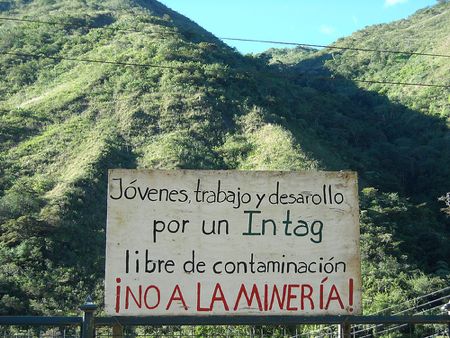Global Voices Online, January 19 2009

“Young People, Work and Development for an INTAG (cloud forest reserve) free of contamination and free of mining!” Image by d∂wn and used under Creative Commons lisense.
Despite protests and road blockades in southen Ecuador, a new mining law [es] (pdf format) was passed in Congress. Now the new bill will head to the executive branch for final approval from President Rafael Correa. Opposition to the bill is coming from indigenous groups, who have called for a national march to be held on January 20 to protest the government's support for the new law.
The mobilization is being led by the country's largest indigenous organization, the National Confederation of Indigenous Nations (CONAIE), which is stating that there was very little discussion regarding the new law and that it will be harmful to the environment and is going against the sovereignty of indigenous communities. What makes this march especially interesting is that these communities have been generally very supportive of Correa and his administration, and now they are leading the way against his policies.
The last time Ecuador has seen mobilizations of this magnitude was in 2005, when protests forced then-President Lucio Gutiérrez from office. They are even attracting the support of other indigenous groups [es], such as the Indigenous Movement Confederation of Chimborazo (COMICH) in the northern part of the country. Up until now, many of these sectors have been content with President Rafael Correa, but now he is dismissing the actions of these groups led by CONAIE. This confederation, according to blogger Inca Kola is “a smart, canny intelligent political animal” and that it is leading the movement for the promotion of indigenous sovereignty.
One blogger, Fernando Doylet of Madurando Con Sentido [es] is backing the indigenous protests and suggests that local communities decide what is best for their territories and that they should have veto power:
En mi humilde opinion, lo mejor que puede hacer el gobierno (por medio del Ministerio correspondiente) es dejar que los gobiernos locales decidan si autorizan o no la mineria en sus areas geograficas; y si la mayoria de la poblacion rechaza lo que decida el gobierno local, pues que lo cambie.
No creo que ninguna ley deba obligar o negarle sus derechos a los pobladores de un sector; y si tanto le interesa al gobierno central, tiene que ser convencer a la gente, en lugar de simplemente ignorarlos.
In my humble opinion, the best that this government could do (through the proper Ministry) is allow for local governments to decide whether or not they authorize mining in their geographic areas; and if the majority of the population rejects what the local government decides, then they should change it.
I don't think that no law should force or deny the rights of residents of an area; and if it such an interest for the central government, then they must convince the people, instead of simply ignoring them.
Other issues are also at stake. La Voz de Guamote [es] writes about an environmental group Acción Ecológica (Ecological Action) that protested outside the Legislative Palace and participated in a hunger strike. One of the major complaints of this new mining law is that it will jeopardize sources of water for area residents. However, one blogger is making light of this complaint. El Botulista Independiente [es] writes a satirical post regarding solving the water contamination problem:
La explotación de oro y cobre proporcionará al Estado más de cien mil millones de dólares. Con esas cantidades, sin lugar a dudas nos sobrarían recursos para importar agua embotellada. Si bien es cierto que la minería a cielo abierto no es 100 % segura, el gobierno ha previsto la firma de un convenio con la compañía francesa Evian, para asegurar a nuestros campesinos el acceso a agua de la mejor calidad para sus cultivos.
However, not all indigenous groups are against the new mining law. The community coordinator of the Shuar indigenous group, Antonio Chirias, believes that the new mining law will help his Amazonian community in the country's Orient region [es]. The previously quoted blogger Inca Kola, who writes on economic and banking issues across Latin America believes that the mining law deserves attention and applauds the president, “Correa has done great service to his country via this new law. It banishes the speculators and wide-boys from the scene, it protects the environment (I mean, woe betide any miner that tries to cut corners on this piece of statute) and it will allow Ecuador to grow as a country in a responsible way.”
On January 20, the eyes of the world will be on the U.S. for the inauguration of President-elect Barack Obama and the eyes of Ecuador will be on the marches planned for the same day. President Correa will face a challenge from the protests of groups that have historically supported his government. As B.P.L.E [es] writes:
Veremos como sale parado de ésta el Presidente Correa ahora que debe medirse no con pelucones sino con su mismo “pueblo organizado”
We'll see how President Correa comes out of this, now that he must face not his “opposition” but his very own “organized people.”


No comments:
Post a Comment